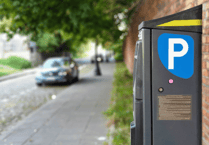The agricultural insurer released its 2022 Rural Crime Report this week, finding that the overall cost of rural crime in the two counties dropped by 37% in 2021, to an estimated £460,000.
However, following this decrease, NFU Mutual’s data also indicated that crime across Devon and the UK as a whole began to rise again towards the end of 2021 and throughout the first quarter of 2022.
They attribute this rise to thieves making up for time lost over the pandemic, as their insurance claims were over 40% higher than the same period last year.
Many farmyard crimes continued, such as agricultural vehicle theft, which NFU Mutual reported the costs to remain at over £9m.
Rustling became a more lucrative enterprise for criminal gangs, and the latest analysis shows farm animals worth an estimated £2.4m were stolen in 2021. Soaring food prices could mean that livestock theft now increases, raising concerns about food security, animal welfare and people’s health due to stolen animals being slaughtered in unhygienic conditions.
Neil Cole, a sheep farmer on Dartmoor, said: ‘We lose dozens of sheep annually – I would estimate that we have between 20 and 30 stolen each year.
‘Even after all these years, it still has a real emotional impact when our animals are taken – aside from the obvious financial cost.
‘Lots of effort and hard work goes into caring for and rearing them and then when you find that someone has just come along and taken your animals without a thought, it really does affect you. It’s heartbreaking.’
In response to this issue, NFU Mutual joined forces with the Devon and Cornwall Police to launch a new initiative to protect livestock from rustling. Known as the Devon Livestock Initiative, the project was originally trialled by several Dartmoor farmers in 2021, who were given gate sensors, cameras and signs asking the public to report suspicious movements of livestock outside given times.
Due to its success, the initiative is soon to be expanded, and new ways are being explored to keep livestock safe such as UV markers and microchips in the fleece of sheep.
As part of the initiative, Neil said: ‘As well as the signs, we have begun marking our sheep with a special paint on their horns, which is almost impossible to remove and makes them easier to identify. There will no doubt be a range of other measures we can employ as the initiative expands.’
PC Martin Beck of the Devon & Cornwall Police Rural Affairs Team, said: ‘The response to the Devon Livestock Initiative has been fantastic and highlights the importance of raising awareness of these issues and encouraging our communities to help farmers fight rural crime.
‘There are many advances in the technology available to farmers and we will be exploring and trialling these options through our partnership with NFU Mutual.’





Comments
This article has no comments yet. Be the first to leave a comment.